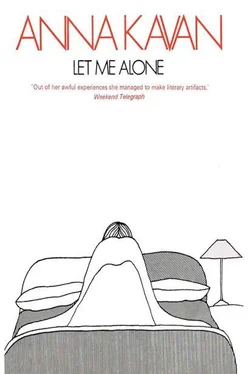Anna went up to her room when it was time to dress, feeling cold and unnatural. It seemed strange to be changing one’s clothes in the middle of the morning. The dress in which she was to be married was a plain affair, straight and parchment-coloured; not really a wedding-dress at all. It would do later on for afternoons. She was soon ready. The sky darkened, and rain came hissing down, hissing like steam against the window-panes. Her light dress seemed out of place in the rainy twilight. She sighed. For the pale dress was so incongruous: it made her feel more and more unnatural, like a victim. Surely, in some way, she was being victimized. And yet, really, in her heart, she felt nothing at all. There was a blank indifference in her heart.
She went downstairs, a restless ghost in her pale clothes, feeling lost. The corners of the rooms were darkly shadowed, there seemed to be no one about. Outside, the rain fell angrily, but with declining power. The sky was lightening.
Anna went from room to room, opening and shutting doors, peering through the obscurity at the familiar places. But now she seemed to see it all strangely, from the angle of her approaching departure. Her light skirt rippled in the draught — how unsuitable it felt to her.
In the dining-room, the servants had already begun to prepare the big table for the lunch party. No edibles as yet, but the best table-linen, the most delicate glasses, the brightest silver, all gleaming with a chaste pure white gleam, and a glitter of facetted glass like sparks rising in the dimness. Some white flowers were stirring as she opened the door and the curtains blew about. It was all rather desolate. She shivered, thinking of funerals, and of her father. She felt so cold, so empty. And everything seemed meaningless and far away. The indifference — the horrible indifference.
It was clearing up outside. The room brightened slowly. Anna stood still, staring at the brightest thing in the room: a bright globe of glowing green, like a huge drop-emerald. She did not realize it at first. What was it? Looking more objectively, she recognized a bottle of bright green liqueur, forgotten and temporarily abandoned on the sideboard. She took hold of it, feeling the slight, velvety stickiness overlaying the cold, brittle smoothness of the glass. Without thinking much, she tilted it, and the green stuff ran out quickly, quicker than she had expected, up the long, tube-like neck of the bottle, and filled the glass. It was a surprise to find that it flowed so quickly, the sticky, heavy-looking stuff. She drank it up, rather disliking it, the burning, sharp-sweet taste of it. But it was hot. She felt warmer afterwards
‘Anna! What have you been doing?’ Lauretta scrutinized her closely. But there was no time for talk. They had to start for the church.
Anna sat in her corner of the car watching Heyward Bland, who was going to give her away. He had got himself up very smartly for the occasion, very spruce and correct, with a white flower in his buttonhole. But the fuss and excitement made him rather irritable. Catching her eye he smiled in a forced fashion and patted her chilly hand. Then he coughed and cleared his throat irritably. He seemed stiff and pompous beside her, and she disliked his proximity. However, he was doing his best to be friendly.
There was an undignified dash across the churchyard to the shelter of the porch. It had stopped raining, but the squally wind was still driving cold flurries of water from the dripping branches. Lauretta was frowning, worried about her beautiful dress. The Colonel looked more irritated than ever. Anna laughed and ran up the path, avoiding the puddles. A sort of recklessness had come over her. She felt like some other girl, quite detached. Perhaps it was the liqueur which had gone to her head.
They went into the church, and the first thing she saw was Matthew, standing in the aisle, waiting for her. She smiled at him, almost gay, in her new recklessness. Matthew smiled back, very faintly and constrainedly, in return; she could see that he was put out, even annoyed, by her frivolous air. It was evidently a serious moment for him.
Feeling dashed, she took her place beside him. His solemnity made her uncomfortable. Was it possible that this ecclesiastical rigmarole had genuine significance for him? She noticed how dry and close the hair was on his head; as though it had no sap in it, no life of any kind. He did not look at her, though she knew he was aware of her regard. Obstinately he turned his stiff profile, and refused to look. They moved up towards the altar.
The church was new and rather ugly and bare, with a look of being strictly utilitarian and hygienic. There was something rather mean about the red brick, and the stumpy pillars, and the rows of cheap wood pews; proletarian. Lauretta’s expensive flowers looked both haughty and forlorn. On one wall someone had started to paint a biblical scene, life-size, all in drab browns and greys and a muddy-looking olive-green. There was a boat in it, and improbable, woolly-headed, conventional waves. It was supposed to represent Peter walking on water. The place was bitterly cold.
Anna shivered as she knelt in the bleak church, in front of the altar. Her dress was much too thin, there was no protection in the pale stuff. Only her head felt hot; and in her mouth the hot, bitterish taste of the liqueur still lingered like a satirical comment. The clergyman read out some words, and Matthew Kavan repeated them, distinctly, with a certain satisfaction, relishing them. Then it was her turn. She stumbled through her part, watching the ugly, life-sized figures on the wall, the men with their curly beards and dirty-coloured clothes. The painter had, in a strange way, managed to suggest in all the faces a meanness, a vulgarity, something petty and sordid that belonged essentially to English twentieth-century industrialism. It made Anna think of factories, and long grey streets of little houses, and backyards with dingy washing hanging out, and a smell of fish frying. All of which she particularly loathed. In reaction, she felt a sudden stirring towards Lauretta, who represented the other side of the picture. But she could never be friends with her. There had always been an impassable barrier between her and Lauretta. Higher and higher it had grown, topped with barbed spikes of resentment and enmity. And now she was going to leave Lauretta for good. Strange, to be going away. But she was glad, very glad, to make her exit. She had had enough of Lauretta. How far she had grown already, through the years, from the child whom Lauretta had visited at Mascarat, and impressed and bewildered and patronized with her fluttering charm. Life, the express train, had got into its stride already.
She glanced sideways at Matthew, who was kneeling beside her, hiding behind his neat brown profile. But Matthew seemed perfectly unreal: so inhuman. Ridiculous that he thought he was being married to her!
Matthew, the surprise packet, was kneeling beside her, touching her. But there was no contact between them, no possible connection. The strange being, how remote he seemed. Unreal, he seemed to her, just a shape and a colour and a queer round, hard head, like his own effigy moving about the world. But he was thinking about her. She could feel in him, underneath his attention to what was going on, a preoccupation with herself, a disapproval. He disapproved — she could feel it — of her wandering thoughts, of her lack of solemnity, of her failure to be impressed by the moment. As she knelt at his side, pale and grave and abstracted, she could feel his irritable thoughts playing upon her, in spite of his devout concentration. He wanted to be serious and devout. To appreciate the solemn occasion. But some other instinct kept his thoughts, under his superficial attention, sliding out persistently to the proud, aloof girl beside him. He almost hated her for her distracting influence. But he could not keep his thoughts away.
Читать дальше












